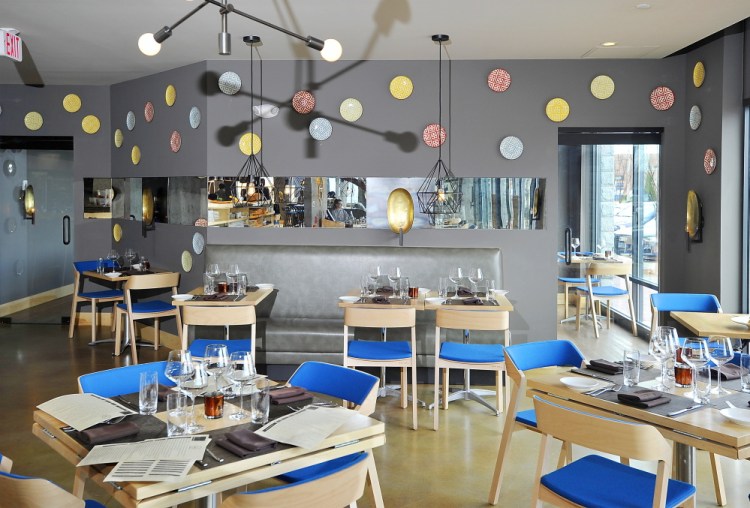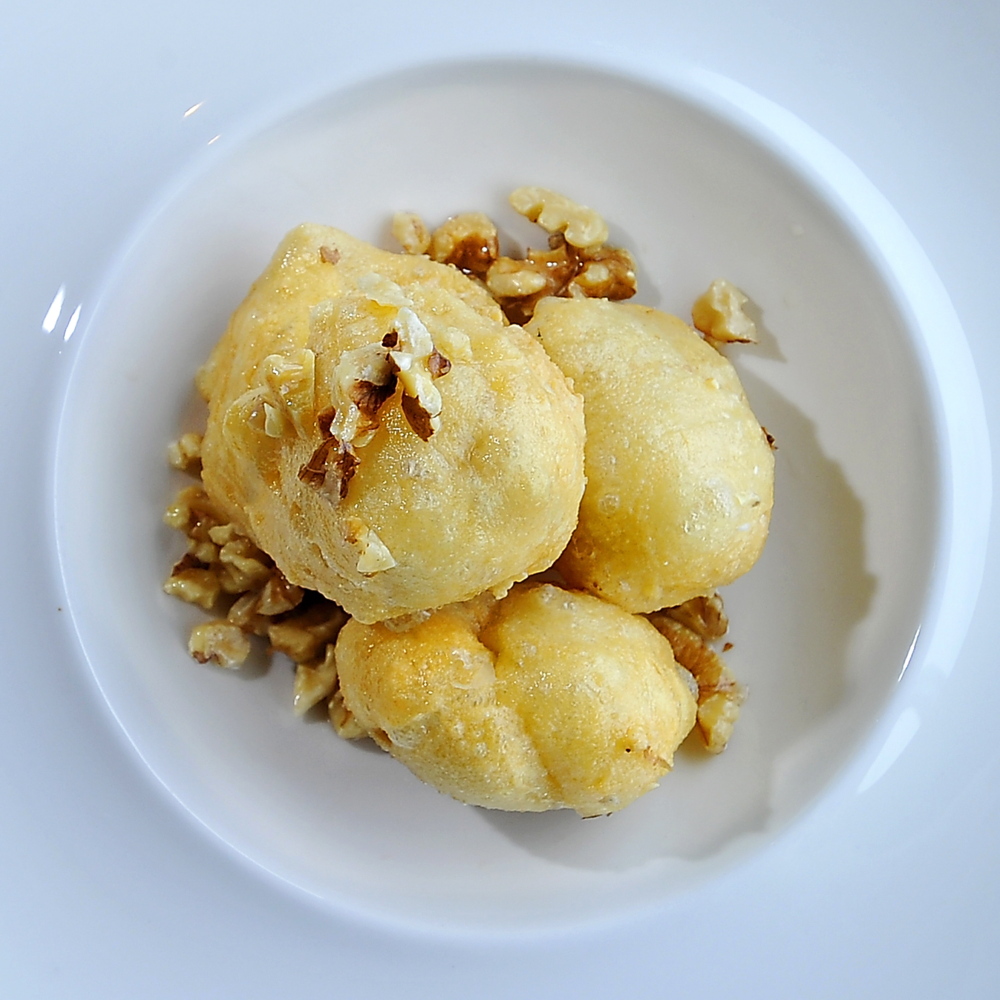Walk inside Tiqa, the sparkling new restaurant next to the Marriott Courtyard on Commercial Street and the energetic young staff will say, “Welcome. We’re happy to answer all of your questions.” And that’s a good thing because you’re likely to have quite a few.
First, the name: “It’s Iraqi slang for kabob,” our waitress explained, “and you’ll find a list of kabobs inspired by the traditions of Israel, Portugal, Tunisia, Libya and Turkey on our menu.” Then the cuisine, which the sign over the door identifies as pan-Mediterranean, and Deen Haleem (who co-owns the restaurant with his wife, Carol Mitchell) says “draws from the cultures of southern Europe, the Middle East and North Africa.”
What about that bowl of dried herbs that appears on the table with house-made pita and focaccia? “Za’atar,” the waitress said, a Middle Eastern blend of thyme, oregano, sesame seeds and sumac that’s compulsively good sprinkled over a hunk of bread that you’ve moistened with the olive oil on the table.
And sumac? It’s not the itch-inducing North American variety, but a potent seasoning made from red berries that flourish on bushes native to the Middle East. Powdered sumac has a citrusy quality that one cook working in Tiqa’s open kitchen compared to “dried-out pink lemonade.”
I had more questions about the sleek dining room, which is filled with surprisingly comfortable low-backed chairs and soothing blue accents. Turns out it’s not one room but several: a lounge with couches and high-tops, a chef’s bar, a main dining area, a private room used for overflow on weekends, plus a patio. Just how many customers can they serve? “If you count the lounge and the outdoor seating opening in two weeks, we can do 310 covers,” Haleem said. As a result, the restaurant can get noisy. (Go early for a quieter experience.)
The answer to one question – How’s the food? – proves more nuanced. Generally it’s good, with fresh, satisfying dishes loaded with aromatics. But despite the exotic descriptions provided by staff and the enthusiastic use of regional spices, some of the dishes fall flat.
Take the oddly named Italian Broccolini Fritto Misto ($9): There was nothing misto, or mixed, about the vegetables assembled on the plate. Only stalks of broccolini tossed in rice flour and plated with tomato-mustard and a few dollops of tangy farmers cheese. Those complements were good – especially the jam-like tomato mustard (when I asked one cook, “What’s in this?” he answered, “What isn’t?” The ingredients included stewed tomatoes, onions, roasted red peppers, cinnamon, ginger, cloves, dry mustard and white wine vinegar.) Still, the spears of broccolini were gummy and greasy and in dire need of salt. Had they been more delicately coated, I might have actually tasted the vegetable.
Falafel ($6) was much the same: bland and heavy rather than crisp and fresh. To be fair, a friend who loves falafel tried the shwarma (a sort of wrap) and called it “fine,” but I was still underwhelmed.
The roasted Brussels sprouts ($7) were much better. Associated on the menu with the cuisine of Morocco, they were lightly browned and crunchy, tossed with a fragrant sesame-oil-and-sherry-vinegar dressing, sprinkled with black and white sesame seeds and elevated by a drizzle of the tahini-parsley paste painted onto the plate. Brussels sprouts are popular at restaurants across Maine at the moment, but those at Tiqa stand out.
Equally tasty was the Sicilian Coda Brasto del Libano ($22), a mound of meltingly tender ox tail braised with sumac, then tossed with ribbons of house-made turmeric pappardelle and sprinkled with dukkah. I flagged down the waitress to ask (again) about dukkah. It’s an Egyptian blend of herbs and nuts that varies from region to region, I learned; Tiqa’s version contained toasted almonds, hazelnuts, pistachios, coconut and a dusting of coriander and cumin, and the texture was as tantalizing as the aroma. The serving size of ox tail was modest. If they’d offered more, I would have accepted with pleasure.
Sofregita ($20), on the other hand, suffered from a paucity of seasoning. The seafood stew was filled with chunks of white fish and lobster, mussels and manila clams, plus fried calamari that, unlike the broccolini, was properly crisp. Unfortunately, the stew had no punch, no complexity and very little pleasing spice. The kitchen adds toasted almond butter for richness, but I couldn’t taste it. Those morsels of fish and shellfish deserved better.
Wondering whether consistency was a casualty of Tiqa’s ambitious menu – or the busy evening rush – I returned for lunch and tried Portuguese chicken merguez ($13). The house-made sausage is threaded onto a skewer, grilled like a kabob and served on a bed of yellow rice finished with turmeric and lemon juice. And while the rice was a disappointment – colorful yet flavorless – the rosy merguez was memorable: succulent, impeccably charred, spiked with cumin, coriander, garlic and (according to chef Bryan Dame) “tons of paprika.” When this kitchen focuses on flavor, it succeeds.
That was abundantly obvious at dessert. Sorbets and dessert are made daily in small batches, and the raspberry sorbet ($6) was tart and smooth and redolent of summer. Almost as good were loukoumades ($7), fragrant, floral Greek-style doughnuts served still steaming from the fryer. Pastry chef Lynette Mosher fries spoonfuls of yeast-risen batter enriched with almond milk, then tosses the golden brown crunchy puffs with a rose water-infused syrup that had me quoting Gertrude Stein.
Tiqa plans to regularly adjust its menu as more local products come into season, and the owners say they’ll work to keep at least two appetizers, two entrees and two desserts from every region on the menu at all times. One last question: Could they lose a few of those far-flung dishes and focus on the promising ones instead? If the answer is yes, I’ll be back.
James H. Schwartz has covered food, travel and architecture for The Washington Post, Down East, Coastal Living and Southern Living magazines for more than 30 years. Long a commuter between Portland and Washington, D.C., he retired from his job as vice president at the National Trust for Historic Preservation in 2013 and relocated to Maine.
Note: This story was edited on April 27 to correct the name of Tiqa’s chef.
Send questions/comments to the editors.




